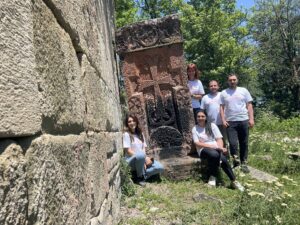Adjunktprofessur / Remote Laboratory
Interdisciplinary Armenian Cultural Heritage Studies (IACHS)
Institut für Archäologie und Ethnographie der Akademie der Wissenschaften der Republik Armenien
2023-2028
Das Projektteam unter der Leitung des österreichischen Amenologin J. Dum-Tragut untersucht das armenische Kulturerbe mit einem neuen interdisziplinären, integralen und integrativen Ansatz. Das bedeutet, dass das Wissen und die Methoden der verschiedenen beteiligten Wissenschaften, d.h. Armenische Studien, Kulturologie, Archäologie und Ethnographie usw. optimal genutzt werden. Integral bedeutet, dass das gesamte kulturelle Erbe – materiell und immateriell – zueinander und zu seiner Umgebung in Beziehung gesetzt wird, und integrativ bedeutet, dass die lokale Bevölkerung sowohl als Träger der immateriellen Kultur als auch als Informations- und Entscheidungsquelle einbezogen wird. Konkret untersucht, analysiert und dokumentiert das derzeit fünfköpfige Team das Kulturerbe ausgewählter Siedlungen in den Grenzregionen der Provinzen Tavush, Gegharkunik und Syunik. Dabei kommen modernste Methoden der GIS-Archäologie, der Photogrammetrie und der Digital Humanities, d.h. computergestützte Programme für Datenbanken, zum Einsatz.
Interdisciplinary Armenian Cultural Heritage Studies (IACHS)
Projektleiterin: J. Dum-Tragut (Armenologie, Linguistik), Universität Salzburg
Lokale Projektleiterin: Haykuhi Muradyan (Kulturologie),
Projektteam: Anush Safaryan (Kulturologie), Hamazasp Abrahamyan (Archäologie) und Artyom Ananyan (GIS-Archäologie)

Das Projekt wird vom Komittee für Hochschulbildung und Wissenschaft des Ministeriums für Bildung, Wissenschaft, Kultur und Sport der Republik Armenien finanziell unterstützt.
Adjunct professorship/Remote Laboratory
Interdisciplinary Armenian Cultural Heritage Study (IACHS)
Institute of Archaeology and Ethnography of the National Academy of Sciences of the Republic of Armenia, 2023-2028
The project team, led by the Austrian Amenologist J. Dum-Tragut, is studying the Armenian cultural heritage with a new interdisciplinary, integral and integrative approach. This means that the knowledge and methods of the different sciences involved, i.e. Armenian studies, cultural studies, archaeology and ethnography, are used in an optimal way. Integral means that the entire cultural heritage – tangible and intangible – is related to each other and to its environment, and inclusive means that the local population is involved both as a carrier of the intangible culture and as a source of information and decision-making. Specifically, the five-member team is investigating, analyzing, and documenting the cultural heritage of selected settlements in the border regions of Tavush, Gegharkunik, and Syunik provinces. State-of-the-art methods of GIS archaeology, photogrammetry and digital humanities, i.e. computer-assisted programs for databases, are used.
The project is financially supported by the Republic of Armenia Ministry of Education, Sciences, Culture and Sport Higher Education and Science Committee.
Project instigator and leader: J. Dum-Tragut, University of Salzburg
Local Project instigator: Haykuhi Muradyan (Cultural Anthropologist)
Project team: Anush Safaryan (Culturologist), Hamazasp Abrahamyan (Archaeology) and Artyom Ananyan (GIS Archaeology)




